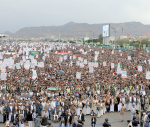You are here
Jordanian Question Initiative holds tax law discussion to brainstorm ideas
By Sawsan Tabazah - Sep 02,2018 - Last updated at Sep 02,2018
AMMAN — Jordan’s tax system should be tied to the benefits’ system, as it is the case in most countries around the world, economist Samer Rjoub said during a panel discussion held on Saturday to discuss the new tax law.
Orchestrated by the Jordanian Question Initiative, the panel discussion witnessed the attendance of government officials, industry experts and various stakeholders.
For Rjoub, the state must study a possible benefits system tied into the tax system through which taxed individuals could enjoy cash or service advantages in return for what they pay.
MP Qais Zyadeen said that the current tax law is punishing tax payers instead of fighting tax evaders: “Why should I, a young Jordanian, pay taxes while I am not receiving proper health, education or transportation services?”
Ninety-two per cent of treasury proceeds are generated from taxes, of which, 81 per cent is generated by indirect taxes, sales and customs tax, while 19 per cent is generated by direct taxes and income tax, Qusai Suwan, one of the initiative’s founders said.
The former government sought to raise taxes to reduce the budget deficit which has reached half-a-billion dinars, while unemployment rates are on the rise and have reached around 18 per cent, Suwan added.
Husam Abu Ali, general manager of the Income and Sales Tax Department, said that any tax law should first fix the defects in tax structure such as tax evasion, and reflect the results of dialogue the government of PM Omar Razzaz held with various sectors.
The panelists discussed the challenges facing the Jordanian economy and their hopes of a future tax law that achieves social justice.
Adnan Khadam, head of the Jordan Valley Farmers Union, talked about the problems facing the agricultural sector in Jordan, after the government imposed a 10 per cent tax on agricultural inputs earlier this year.
We believe that taxes are a national duty, but the agriculture sector has lost over JD7 billion in the last 10 years as a result of the Syrian and Iraqi border closures.
“42 per cent of the Jordanian people work in agriculture.” Khadam said, adding that there is a need to support the sector instead of imposing taxes on it.
Salah Qudah, the secretary general of the Jordanian Future Party said that the new tax law should coincide with article 111 of the constitution and achieve the social justice
The article 111 says: “…the Government shall be guided by the principles of progressive taxation, coupled with the insurance of equality and social justice, provided that taxation shall not exceed the capacity of taxpayers or the State’s requirements for funds.”
The Jordanian Question Initiative was inspired by July’s Fourth Circle events where youth from different political and social backgrounds flocked to the streets peacefully and denounced the economic policies of former prime minister, Hani Mulki’s government, Suwan said.
“Since all those calling for change are youth. We thought that there should be a platform where they can discuss national and political issues with officials, which can contribute to solving the problem and raising the awareness of public issues,” Suwan told The Jordan Times.
Related Articles
AMMAN — The ratio of tax burden to gross domestic product in the Kingdom stood at 26.5 per cent in 2017, a government study has shown.
AMMAN — The Phenix Centre for Economics and Informatics Studies on Saturday issued a policy paper criticising the tax system in Jordan, labe
AMMAN — Endorsing the proposed new version of the Income Tax Law must be accompanied by reducing the sales tax, according to a research by t
















